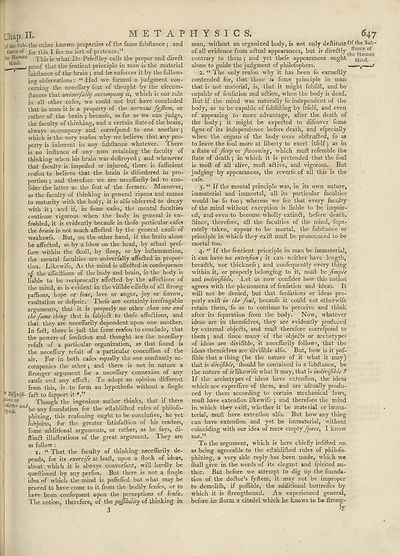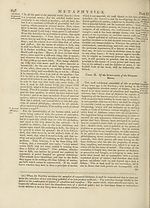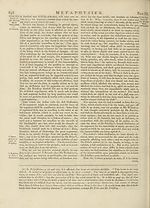Encyclopaedia Britannica, or, a Dictionary of arts, sciences, and miscellaneous literature : enlarged and improved. Illustrated with nearly six hundred engravings > Volume 13, MAT-MIC
(693) Page 647
Download files
Complete book:
Individual page:
Thumbnail gallery: Grid view | List view

Chap. II. M E T A P
3f the Sub-the other known properties of the fame fubftance; and
ftance of for this I fee no fort of pretence.”
he Human 'j']^ jg w]iat Dr Prieftley calls the proper and direcl
^]‘n ' , proof that the fentient principle in man is the material
fubftance of the brain } and he enforces it by the follow
xng obfervations: “ Had we formed a judgment con¬
cerning the neceflary feat of thought by the circum-
ftances that univerfally accompany it, which is our rule
in all other cafes, we could not but have concluded
that in man it is a property of the nervous fyjtem, or
rather of the brain •, becaufe, as far as we can judge,
the faculty of thinking, and a certain ftate of the brain,
always accompany and correfpond to one another ;
which is the very reafon why we believe that any pro¬
perty is inherent in any fubftance whatever. There
is no inftance of any man retaining the faculty of
thinking when his brain was deftroyed j and whenever
that faculty is impeded or injured, there is fufficient
reafon to believe that the brain is difordered in pro¬
portion ; and therefore we are neceffarily led to con-
fider the latter as the feat of the former. Moreover,
as the faculty of thinking in general ripens and comes
to maturity with the body, it is alfo obferved to decay
with it j and if, in fome cafes, the mental faculties
continue vigorous when the body in general is en¬
feebled, it is evidently becaufe in thofe particular cafes
the brain is not much affetted by the general caufe of
weaknefs. But, on the other hand, if the brain alone
be affefted, as by a blow on the head, by atftual pref-
fure within the fkull, by fleep, or by inflammation,
the mental faculties are univerfally affe&ed in propor¬
tion. Likewife, As the mind is affe&ed in confequence
0/ the affetftions of the body and brain, fo the body is
liable to be reciprocally affe£led by the affe&ions of
the mind, as is evident in the vilible effe£ts of all ftrong
paflions, hope or fear, love or anger, joy or forrow,
exultation or defpair. Thefe are certainly irrefragable
arguments, that it is properly no other than one and
the fame thing that is fubjefl to thefe affe&ions, and
that they are neceflarily dependent upon one another.
In faft, there is juft the lame reafon to conclude, that
the powers of fenfation and thought are the neceffary
refult of a particular organization, as that found is
the neceffary refult of a particular concuflion of the
air. For in both cafes equally the one conftantly ac¬
companies the other; and there is not in nature a
ftronger argument for a neceffary connexion of any
caufe and any effeft. To adopt an opinion different
from this, is to form an hypothefis without a Angle
Difquifi- fafr to fupport it
tionson Though the ingenious author thinks, that if there
Spi^andbe any foundation for the eftablilhed rules of philofo-
phizing, this reafoning ought to be concluiiye, he yet
fubjoins, for the greater fatisfa&ion of his readers,
fome additional arguments, or rather, as he fays, di-
ftinft illuftrations of the great argument. They are
as follow:
I. “ That the faculty of thinking neceffarily de¬
pends, for its exercife at leaft, upon a flock of ideas,
about which it is always converfant, will hardly be
queftioned by any perfon. But there is not a Angle
idea of which the mind is poffefled but what may be
proved to have come to it from the bodily fenfes, or to
have been confequent upon the perceptions of fenfe.
The notion, therefore, of the pojjibility of thinking in
3
H Y S I C S. 647
man, without an organized body, is not only deftitute Of the Sub-
of all evidence from adlual appearances, but is directly
contrary to them; and yet thefe appearances ought
alone to guide the judgment of philofophers. y-—J
2. “ The only reafon why it has been fo earneftly
contended for, that there is fome principle in man
that is not material, is, that it might fubftft, and be
capable of fenfation and a&ion, when the body is dead.
But if the mind was naturally fo independent of the
body, as to be capable of fubfifting by itfelf, and even
of appearing to more advantage, after the death of
the body; it might be expected to difcover fome
figns of its independence before death, and efpecially
when the organs of the body were obftrudled, fo as
to leave the foul more at liberty to exert itfelf; as in
a ftate of Jlcep or fwooning, which muft referable the
ftate of death; in which it is pretended that the foul
is mod; of all alive, moft active, and vigorous. But
judging by appearances, the reverfe of all this is the
cafe.
3. “ If the mental principle was, in its own nature,
immaterial and immortal, all its particular faculties
would be fo too; whereas we fee that every faculty
of the mind without exception is liable to be impair¬
ed, and even to become Avholly extin61, before death.
Since, therefore, all the faculties of the mind, fepa-
rately taken, appear to be mortal, the fubftance or
principle in which they exift muft be pronounced to be
mortal too.
4. “ If the fentient principle in man be immaterial,
it can have no extenfion ; it can neither have length,
breadth, nor thicknefs; and confequently every thing
within it, or properly belonging to it, muft be Jimple
and indivi/ible. Let us now confider how this notion
agrees with the phenomena of fenfation and ideas. It
will not be denied, but that fenfations or ideas pro¬
perly exift in the foul, becaufe it could not otherwife
retain them, fo as to continue to perceive and think
after its feparation from the body. Now, whatever
ideas are in themfelves, they are evidently produced
by external objedls, and muft therefore correfpond to
them; and lince many of the objetb or archetypes
of ideas are divifible, it neceffarily follows, that the
ideas themfelves are divifible alfo. But, how is it pof-
fible that a thing (be the nature of it what it may)
that is divifible, Ihould be contained in a fubftance, be
the nature of //likewife what it may, that is indivijible ?
If the archetypes of ideas have extenfion, the ideas
which are expreflive of them, and are actually produ¬
ced by them according to certain mechanical laws,
muft have extenfion iikewife ; and therefore the mind
in which they exift, whether it be material or imma¬
terial, muft have extenfion alfo. But how any thing
can have extenfion and yet be immaterial, without
coinciding with our idea of mere empty fpace, I know
not.”
To the argument, which is here chiefly infifted on
as being agreeable to the eftabliftied rules of philofo-
phizing, a very able reply has been made, which we
fhall give in the words of its elegant and fpirited au¬
thor. But before we attempt to dig up the founda¬
tion of the doflor’s fyftem, it may not be improper
to demolilh, if poflible, the additional buttreffes by
which it is ftrengthened. An experienced general,
before he ftorm a citadel which he knows to be ftrong-
¥
3f the Sub-the other known properties of the fame fubftance; and
ftance of for this I fee no fort of pretence.”
he Human 'j']^ jg w]iat Dr Prieftley calls the proper and direcl
^]‘n ' , proof that the fentient principle in man is the material
fubftance of the brain } and he enforces it by the follow
xng obfervations: “ Had we formed a judgment con¬
cerning the neceflary feat of thought by the circum-
ftances that univerfally accompany it, which is our rule
in all other cafes, we could not but have concluded
that in man it is a property of the nervous fyjtem, or
rather of the brain •, becaufe, as far as we can judge,
the faculty of thinking, and a certain ftate of the brain,
always accompany and correfpond to one another ;
which is the very reafon why we believe that any pro¬
perty is inherent in any fubftance whatever. There
is no inftance of any man retaining the faculty of
thinking when his brain was deftroyed j and whenever
that faculty is impeded or injured, there is fufficient
reafon to believe that the brain is difordered in pro¬
portion ; and therefore we are neceffarily led to con-
fider the latter as the feat of the former. Moreover,
as the faculty of thinking in general ripens and comes
to maturity with the body, it is alfo obferved to decay
with it j and if, in fome cafes, the mental faculties
continue vigorous when the body in general is en¬
feebled, it is evidently becaufe in thofe particular cafes
the brain is not much affetted by the general caufe of
weaknefs. But, on the other hand, if the brain alone
be affefted, as by a blow on the head, by atftual pref-
fure within the fkull, by fleep, or by inflammation,
the mental faculties are univerfally affe&ed in propor¬
tion. Likewife, As the mind is affe&ed in confequence
0/ the affetftions of the body and brain, fo the body is
liable to be reciprocally affe£led by the affe&ions of
the mind, as is evident in the vilible effe£ts of all ftrong
paflions, hope or fear, love or anger, joy or forrow,
exultation or defpair. Thefe are certainly irrefragable
arguments, that it is properly no other than one and
the fame thing that is fubjefl to thefe affe&ions, and
that they are neceflarily dependent upon one another.
In faft, there is juft the lame reafon to conclude, that
the powers of fenfation and thought are the neceffary
refult of a particular organization, as that found is
the neceffary refult of a particular concuflion of the
air. For in both cafes equally the one conftantly ac¬
companies the other; and there is not in nature a
ftronger argument for a neceffary connexion of any
caufe and any effeft. To adopt an opinion different
from this, is to form an hypothefis without a Angle
Difquifi- fafr to fupport it
tionson Though the ingenious author thinks, that if there
Spi^andbe any foundation for the eftablilhed rules of philofo-
phizing, this reafoning ought to be concluiiye, he yet
fubjoins, for the greater fatisfa&ion of his readers,
fome additional arguments, or rather, as he fays, di-
ftinft illuftrations of the great argument. They are
as follow:
I. “ That the faculty of thinking neceffarily de¬
pends, for its exercife at leaft, upon a flock of ideas,
about which it is always converfant, will hardly be
queftioned by any perfon. But there is not a Angle
idea of which the mind is poffefled but what may be
proved to have come to it from the bodily fenfes, or to
have been confequent upon the perceptions of fenfe.
The notion, therefore, of the pojjibility of thinking in
3
H Y S I C S. 647
man, without an organized body, is not only deftitute Of the Sub-
of all evidence from adlual appearances, but is directly
contrary to them; and yet thefe appearances ought
alone to guide the judgment of philofophers. y-—J
2. “ The only reafon why it has been fo earneftly
contended for, that there is fome principle in man
that is not material, is, that it might fubftft, and be
capable of fenfation and a&ion, when the body is dead.
But if the mind was naturally fo independent of the
body, as to be capable of fubfifting by itfelf, and even
of appearing to more advantage, after the death of
the body; it might be expected to difcover fome
figns of its independence before death, and efpecially
when the organs of the body were obftrudled, fo as
to leave the foul more at liberty to exert itfelf; as in
a ftate of Jlcep or fwooning, which muft referable the
ftate of death; in which it is pretended that the foul
is mod; of all alive, moft active, and vigorous. But
judging by appearances, the reverfe of all this is the
cafe.
3. “ If the mental principle was, in its own nature,
immaterial and immortal, all its particular faculties
would be fo too; whereas we fee that every faculty
of the mind without exception is liable to be impair¬
ed, and even to become Avholly extin61, before death.
Since, therefore, all the faculties of the mind, fepa-
rately taken, appear to be mortal, the fubftance or
principle in which they exift muft be pronounced to be
mortal too.
4. “ If the fentient principle in man be immaterial,
it can have no extenfion ; it can neither have length,
breadth, nor thicknefs; and confequently every thing
within it, or properly belonging to it, muft be Jimple
and indivi/ible. Let us now confider how this notion
agrees with the phenomena of fenfation and ideas. It
will not be denied, but that fenfations or ideas pro¬
perly exift in the foul, becaufe it could not otherwife
retain them, fo as to continue to perceive and think
after its feparation from the body. Now, whatever
ideas are in themfelves, they are evidently produced
by external objedls, and muft therefore correfpond to
them; and lince many of the objetb or archetypes
of ideas are divifible, it neceffarily follows, that the
ideas themfelves are divifible alfo. But, how is it pof-
fible that a thing (be the nature of it what it may)
that is divifible, Ihould be contained in a fubftance, be
the nature of //likewife what it may, that is indivijible ?
If the archetypes of ideas have extenfion, the ideas
which are expreflive of them, and are actually produ¬
ced by them according to certain mechanical laws,
muft have extenfion iikewife ; and therefore the mind
in which they exift, whether it be material or imma¬
terial, muft have extenfion alfo. But how any thing
can have extenfion and yet be immaterial, without
coinciding with our idea of mere empty fpace, I know
not.”
To the argument, which is here chiefly infifted on
as being agreeable to the eftabliftied rules of philofo-
phizing, a very able reply has been made, which we
fhall give in the words of its elegant and fpirited au¬
thor. But before we attempt to dig up the founda¬
tion of the doflor’s fyftem, it may not be improper
to demolilh, if poflible, the additional buttreffes by
which it is ftrengthened. An experienced general,
before he ftorm a citadel which he knows to be ftrong-
¥
Set display mode to:
![]() Universal Viewer |
Universal Viewer | ![]() Mirador |
Large image | Transcription
Mirador |
Large image | Transcription
Images and transcriptions on this page, including medium image downloads, may be used under the Creative Commons Attribution 4.0 International Licence unless otherwise stated. ![]()
| Permanent URL | https://digital.nls.uk/192693056 |
|---|
| Attribution and copyright: |
|
|---|
| Description | Ten editions of 'Encyclopaedia Britannica', issued from 1768-1903, in 231 volumes. Originally issued in 100 weekly parts (3 volumes) between 1768 and 1771 by publishers: Colin Macfarquhar and Andrew Bell (Edinburgh); editor: William Smellie: engraver: Andrew Bell. Expanded editions in the 19th century featured more volumes and contributions from leading experts in their fields. Managed and published in Edinburgh up to the 9th edition (25 volumes, from 1875-1889); the 10th edition (1902-1903) re-issued the 9th edition, with 11 supplementary volumes. |
|---|---|
| Additional NLS resources: |
|

